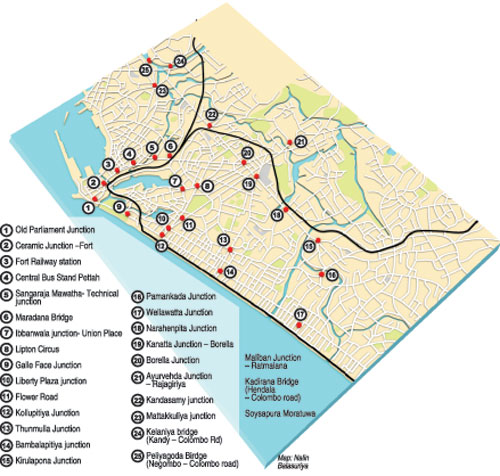It is a weekday evening. A Fort-bound private bus stops in the middle of the road, near the Liberty Plaza junction, and – breaking a road rule – lets passengers off. The driver and the conductor are not aware that they are being watched by a team of specialised police officers, as well as the Defence Secretary, Gotabaya Rajapaksa.
Images of traffic behaviour are beamed by a surveillance camera set up a couple of miles away, as Mr. Rajapaksa and the police surveillance team look at a TV screen in a control room somewhere in Colombo.
 |
| The cameras are very useful. They can be used for a number of purposes, not only to monitor and control traffic. We can keep track of suspicious or criminal behaviour, watch demonstrations, and track
polluting agents. -- Ayub Khan, Assistant Superintendent of
Police, CCTV Division |
The Defence Secretary was chief guest at the official launch last Wednesday of the new closed circuit TV (CCTV) traffic monitoring system. The control room is in the office of the Colombo Deputy Inspector General of Police, Olcott Mawatha. Immediately, instructions go out to have the bus tracked down and the crew fined for violating road rules.
The same Liberty Plaza CCTV camera catches two more traffic offences: a car parked in a no-parking area, and a speeding vehicle cutting across the double lines in the middle of the road. Orders go out to have the owners of both
vehicles fined.
These are among the first detections made via an elaborate network of more than 100 CCTV cameras positioned at 28 key points in the city of Colombo and suburbs.
The recently appointed CCTV Deputy Inspector General (DIG), W. F. Fernando, works with a team of over 30 hand-picked officers with experience in different police units, including the Criminal Investigation Department (CID), Terrorist Investigation Department (TID), and Crime and Traffic Divisions.
“The cameras are very useful,” CCTV division Assistant Superintendent of Police (ASP) Ayub Khan told the Sunday Times. “They can be used for a number of purposes, to monitor traffic and also to keep track of suspicious or criminal behaviour, watch demonstrations, and track polluting agents.”
In the first 24 hours of the CCTV network going into action, the cameras picked up images of traffic violations, illegal garbage disposal in the streets, and suspicious loitering. In the operations room, there is a separate television screen for each of the 100-plus CCTV cameras placed in and around the city. Some of the cameras can be rotated, while the fixed cameras can zoom in on a person or an object.
The Sunday Times attended a trial run of the CCTV road surveillance system, held before the official launch. Two serious accidents – both cases of hit and run – were observed even as they were happening.
 |
| The cameras can
zoom in or be rotated for a 360 degree view. |
In the first incident, which occurred at the Ceramic Junction in Fort, an oncoming bus hit a three-wheeler, which was thrown off the road and burst into flames, while the bus speeded away. The bus was stopped minutes later and the driver arrested. The three-wheeler driver was badly hurt and remains in the Intensive Care Unit of the Colombo National Hospital.
In the other incident, a truck hit a man crossing the road on a zebra crossing on Sir James Peiris Mawatha, Colombo 2, and speeded away. The vehicle was
traced later.The CCTV cameras can also serve to record acts of violence and vandalism in the city, and to identify
trouble-makers and disturbers of the peace.
“All images captured on the CCTVs will be saved in the system for a period of two weeks,” ASP Khan said. “Images considered necessary for future police or legal action will be saved on DVDs. “Some countries save such data for as long as six months. We hope to obtain equipment for saving images for longer periods.”
The CCTV cameras can operate for a straight 48 hours before being re-programmed, and all cameras have a back-up power supply in case of a power cut. “The image data will be systematically reviewed and analysed,” ASP Khan said. “In cases of traffic offences, the images will be saved for immediate action. In cases of crime, camera data from relevant locations will be saved, and may be used as evidence in court.”
Data will be linked to data bases of the Registrar of Motor Vehicles (RMV) and the Immigration Department. DIG Fernando said the system will be upgraded with sensor-cameras that can capture number-plate details of vehicles travelling at high speeds.
 |
| Trained officers
track traffic
movement 24/ 7. |
Two special vehicles fitted with CCTV cameras will be added to the fleet of police vehicles. These vehicles can be used on special occasions where large crowds are expected, such as public
demonstrations.
“The vehicles will allow the police to track crowds and individuals and cover areas not covered by fixed CCTV cameras,” DIG W. F. Fernando explained.
The CCTV road surveillance expansion plan will cover the entire route, from the New Parliament in Kotte to the President’s House in Colombo 1. The next phase will include road surveillance for the towns of Jaffna, Kandy, and Anuradhapura.
DIG Fernando said other countries have used CCTV road surveillance for years, for both traffic monitoring and security purposes.
|





